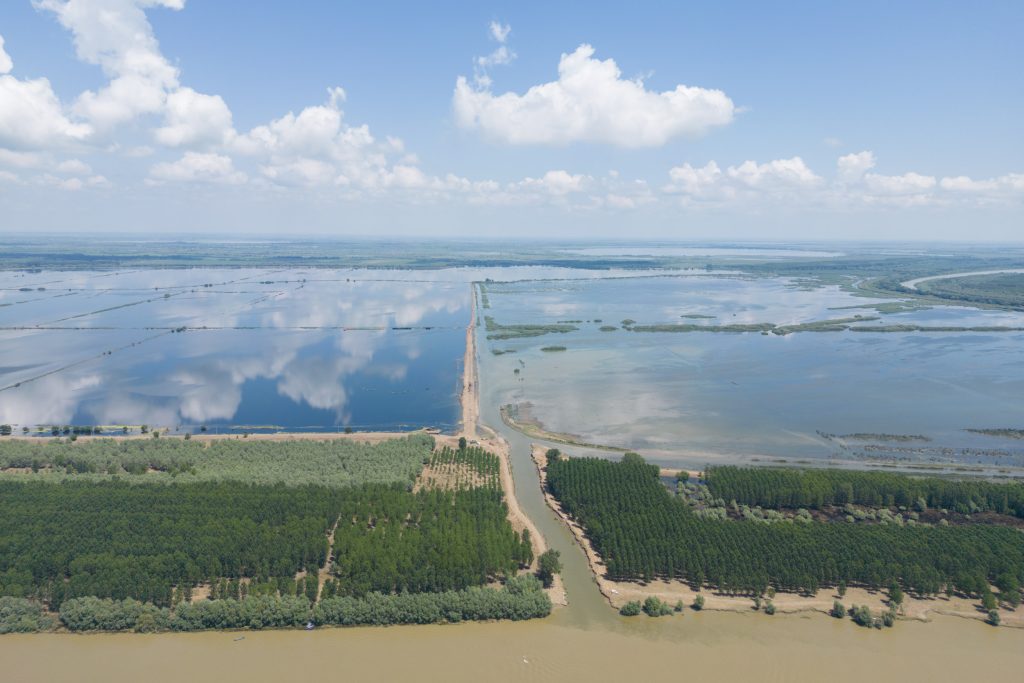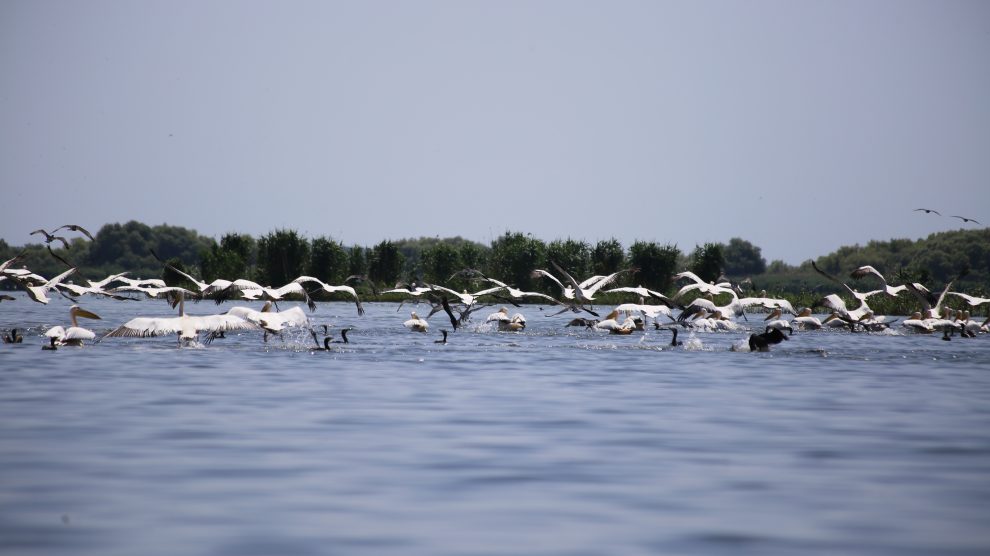The WWF is calling for the wetland in Mahmudia to be designated a ‘national interest ecological restoration area’ by the Romanian government in order to safeguard the natural gains and allow the community to thrive.
A large swathe of naturally restored wetlands in the Romanian Danube Delta could soon be converted back to farmland.
Communities, which reap benefits in terms of local livelihoods and climate resilience from this natural area, stand in opposition of the decision.
- A unique expedition to save the Baltic Sea
- An introduction to Romania in five books
- The botanical beauty of Slovenia’s Lake Bohinj
The controversy began in June 2023 when high waters in the Danube river broke through the dyke surrounding a marshland in Mahmudia, in the east of the Delta.
The area had been restored eight years previously with EU funds and had become a thriving, biodiverse wetland that significantly boosted tourism. The resulting flood inundated 1,000 hectares of farmland, transforming them into a typical delta ecosystem.
The newly flooded wetland was welcomed by the community: 97 per cent of the locals prefer the wetland in its current state instead of it being drained once again for agricultural purposes, according to a WWF-Romania survey. But the area’s agricultural leaseholders secured an initial court decision to reconvert the area back to cropland—an order that also threatens to dry out and destroy the entire wetland, including the area restored with EU funds.
The WWF is now calling for the wetland in Mahmudia to be designated a ‘national interest ecological restoration area’ by the Romanian government in order to safeguard the natural gains and allow the community to thrive.
“WWF stands with the people of Mahmudia as they know how much these restored wetlands benefit their lives and livelihoods,” says Orieta Hulea, WWF-Romania country director. “Restoring healthy wetlands is central to reversing nature loss and building resilience to climate change. Losing this restored wetland would undermine sustainable development in the area and efforts to restore the health of Europe’s greatest wetlands.”

The flooded and restored area at Mahmudia. Photo Marius Vasile WWF-Romania
Between 2012 and 2016, WWF-Romania, in collaboration with the Mahmudia local council and the Danube Delta Biosphere Reserve Administration, successfully restored 924 hectares of the Carasuhat agricultural area to wetland.
The restored ecosystem rapidly enhanced water quality and boosted fish and other wildlife in the area, benefiting local fishers and tourism operators as the site became a magnet for visitors.
The number of rooms for tourists doubled after the restoration, as investors in accommodations considered the restored area as a potential tourist attraction and took advantage of the availability of European funds.
Unsurprisingly, the additional area of wetland that was restored last year following the failure of the dyke was welcomed by an overwhelming majority of the inhabitants of Mahmudia. However, the agricultural leaseholders secured a court ruling to reconvert the area to farmland—even though most of the profits do not flow back into the community or the delta.
”The Danube Delta is one of the most complex and biodiverse areas in Europe. Communities, like those in Mahmudia, will benefit more from healthy wetlands than from intensive agriculture, which damages the local environment, profits big businesses far from the delta, and undermines climate resilience,” says Hulea. “It is time to halt harmful and perverse subsidy schemes in the delta and to urgently protect these restored wetlands by designating them as ‘national interest ecological restoration areas’.”
Romanian law allows the government to safeguard special sites in this way, enabling the agricultural contracts to be annulled and compensation be paid to the leaseholders from the national budget.
Europe’s largest natural wetland
It would also set an important precedent for the Danube Delta, which is Europe’s largest natural wetland and critical for people and nature. Often called ‘the pearl of Romanian tourism’ due to its status as a UNESCO World Heritage Site, large areas of the delta were dammed, drained and converted into farmland during the communist era, undermining local livelihoods, primarily fishing, and driving dramatic nature loss.
“In 2024, we cannot afford to lose more wetlands. Given the EU Biodiversity Strategy which calls for stepping up the protection and restoration of nature and the Ramsar Regional Initiative on Danube Wild Islands, there’s an opportunity for wetland conservation,” says Dr Musonda Mumba, secretary general of the Convention on Wetlands.
“Restored wetlands offer immense ecosystem services contributing to a nature-based economy, such as sustainable tourism. This aligns with the World Wetlands Day theme on human wellbeing. Restoration has the potential to boost conservation and regional development strategies in floodplains and wetlands. Hence, we need to encourage cross-border collaboration to protect this vital wetland.”
Local and regional authorities have recently recognised the importance of wetland restoration but limited progress has been achieved.
On the contrary, major threats to the delta’s wetland ecosystems persist due to the misuse of EU subsidies and the maintenance of policies and financial instruments that prioritise agricultural use. Currently, farmland accounts for almost 13 per cent of the Delta’s surface area—much of it leased to large, often foreign-owned, commercial farming businesses for up to 30 years.
“Given the fragile equilibrium of its wetland ecosystems and the increasing impacts of climate change, large-scale commercial agricultural activities within the Danube Delta Biosphere Reserve are incompatible with sustainable development,” says Hulea.
“The EU’s upcoming Nature Restoration Law shows that Romania should be focusing on restoring the Danube delta – enhancing the health of this globally important wetland and benefiting local communities in places like Mahmudia, who remain firmly opposed to a return to the barren days of large-scale agriculture,” she adds.
Top photo: Bogdan Lungu, WWF-Romania.
Unlike many news and information platforms, Emerging Europe is free to read, and always will be. There is no paywall here. We are independent, not affiliated with nor representing any political party or business organisation. We want the very best for emerging Europe, nothing more, nothing less. Your support will help us continue to spread the word about this amazing region.
You can contribute here. Thank you.



Add Comment